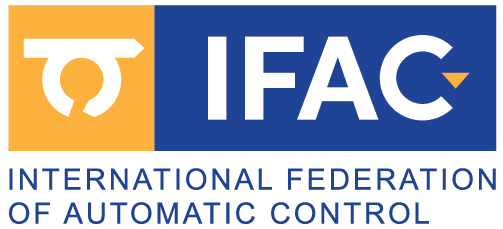Six new open invited tracks are now online:
"Assembly System 4.0": From workstation to assembly line design, from part logistics to information flow management for smart assembly systems in the Industry 4.0 era
Control of intelligent autonomous systems: mobile robots, vehicles and UAVs
Tensor Methods for Modelling and Control
Optimization and control in smart grids
Recent advances in fuzzy control: theory and applications
Diagnosis and Diagnosability of Hybrid Dynamic Systems: Challenges, Methods and Applications
Title: "Assembly System 4.0": From workstation to assembly line design, from part logistics to information flow management for smart assembly systems in the Industry 4.0 era
Track proposed by: Yuval Cohen, Maurizio Faccio, Francesco Pilati
Abstract: The radical changes which distinguished the market during the last decade force to configure assembly systems as flexible assembly lines able to face demand fluctuation, high volumes and continuous customer driven development of new products. Thus, the optimal design and management of assembly systems is crucial to achieve production efficiency, product quality and customer satisfaction. A remarkable opportunity to target these goals and to develop a brand new generation of assembly systems is represented by the current trends in automation, information and communication technology and virtualization of manufacturing processes, known as Industry 4.0 (the fourth industrial revolution).
The implementation of Industry 4.0 principles to assembly processes determine the here defined “Assembly System 4.0”. These novel assembly systems are modularly structured with cyber physical systems, as “smart assembly stations” and “smart part logistic”. These system elements communicate and cooperate with each other and with humans in real time, monitoring physical processes and creating a virtual copy of the physical assembly process to enable quick and decentralized decisions. Beneficial effects are a significant improvement of flexibility and speed of the whole assembly system, that enables to achieve more customized products, an efficient and scalable production and a high variance in production control. Last but not least, proper optimization models, control algorithms, automation technologies and management methods have to be developed to allow the aforementioned smart cyber physical systems of self-optimization, self-configuration, self-diagnosis and intelligent support to workers in their increasingly complex tasks.
This Open invited track seeks original manuscripts to investigate the design and management of “Assembly systems 4.0” exploiting mathematical models and methods, automation technologies, management techniques and approaches as well as industrial case studies.
Code for submitting contributions: bb43b
Full description: PDF
Title: Control of intelligent autonomous systems: mobile robots, vehicles and UAVs
Track proposed by: Hideki Hashimoto, Peter Korondi, Mark Balas, Radhakant Padhi, Zdzislaw Kowalczuk, Ljubo Vlacic
Abstract: Moving devices (mobile robots, vehicles and UAVs) which can operate in non-industrial (nonstandard) environment need to have totally new functions and behaviours. It is not enough to execute a pre-programmed action line. They must be able to adapt to changing environments, make their own decisions and in addition, they might have to socially fit into the human environment. They have to follow regulations developed originally for human beings. It means that new problems of control are emerging and have to be solved. This Open invited track provides an opportunity to present and discuss research and development work in the hot area of intelligent autonomous systems. Researchers and practitioners in the field of land, air and marine robotics are brought together to discuss common problems of theoretical and practical applications, describe scientific and commercial applications and explore the possibilities for future research.
Code for submitting contributions: c7f3j
Full description: PDF
Title: Tensor Methods for Modelling and Control
Track proposed by: Gerwald Lichtenberg
Abstract: Tensors are a basic modelling structure for multidimensional problems in physics for more than a century. In the last decade, new results on tensor based algorithms have been achieved in applied mathematics. Additionally, numerical tools e.g. for CP, tucker, and tensor train decompositions are available. This open invited track welcomes all application and theory related submissions showing the use of tensor methods for modelling, data analysis, representation, reduction, (supervisory) controller design, fault diagnosis and reconfiguration in control engineering.
Code for submitting contributions: y6vab
Full description: PDF
Title: Optimization and control in smart grids
Track proposed by: Michela Robba, Thomas Nudell, Anuradha Annaswamy
Abstract: The increased use of renewable energy, the emergence of distributed generation and storage systems, and, in general, the concept of “smart grids”, necessitate new decision and control schemes for planning and management of energy resources. The proposed Open Invited Track has the objective of collecting contributions related to optimization and control methods for the planning and management of smart grids that include renewable energy, storage systems, distributed generation, buildings with demand response capabilities, microgrids, etc. The application and testing of the proposed approaches to real case studies and research infrastructures are encouraged.
Code for submitting contributions: vth7k
Full description: PDF
Title: Recent advances in fuzzy control: theory and applications
Track proposed by: Zsofia Lendek, Kevin Guelton
Abstract: The aim of this open invited track is to present state-of-the-art results in the area of theory and applications of fuzzy-model-based control design and analysis at large, and to get together well-known and potential researchers in this area. Fuzzy-model-based control provides a systematic and effient approach to the analysis and control of nonlinear systems. It has been employed to deal with a wide range of nonlinear control systems such as continuous-time, discrete-time, hybrid, sampled-data, time-delay, switching, adaptive control systems and so on. However, there is still room for improvement of the existing results in order to propose new techniques for control. This open invited track focuses mainly on the fuzzy-model-based control systems and analysis with emphasis on the theory and applications. The important problems and difficulties on the fuzzy-model-based control systems will be addressed, its concepts will be provided and methodologies will be proposed to handle nonlinear systems using fuzzy-model-based control approaches. The session will cover classical Takagi-Sugeno and polynomial fuzzy models for stability, control and estimation, representing an important field of the TC 3.2, Computational Intelligence in Control.
Web site: none
Code for submitting contributions: d83r2
Full description: PDF
Title: Diagnosis and Diagnosability of Hybrid Dynamic Systems: Challenges, Methods and Applications
Track proposed by: Moamar Sayed-Mouchaweh, Gautam Biswas, Anibal Bregon, Amit Patra and Dimitri Lefebvre
Abstract: In Hybrid Dynamic Systems (HDS), the dynamical behaviors evolve continuously with time according to the discrete mode in which the system is. Consequently, model based diagnosis approaches must take into account both discrete and continuous dynamics as well as the interactions between them in order to achieve correct fault diagnosis. In addition, in HDS, two types of faults may occur: parametric and discrete faults. Parametric faults occur as abnormal changes in the value of parameters describing the continuous dynamics while discrete faults are defined as unexpected, abnormal, changes in the system discrete mode. Discrete event systems approaches deal with discrete faults; while continuous systems approaches deal with parametric faults. HDS approaches need to deal with both arametric and discrete faults, and this significantly increases the task of monitoring and diagnosing faults in the system. This open invited track aims at bringing together researchers working on the fault diagnosis of HDS. The track will provide the researchers with a forum for exchanging ideas, presenting recent advances and discussing challenges related to fault diagnosis of HDS.
Web site: none
Code for submitting contributions: 4y2s1
Full description: PDF






























